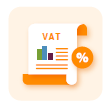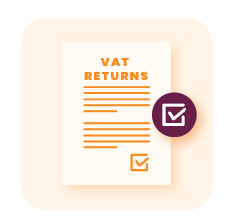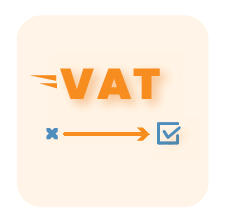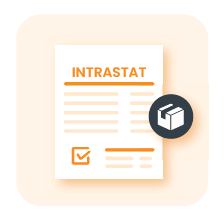Reverse Charge & “Call Off Stock” in Sweden
Chapter 1 Section 2 of the Swedish VAT Act provides information about the Swedish VAT reverse charge mechanism.
This mechanism transfers the tax liability from the supplier to the recipient of the supply. As a result, the recipient is responsible for calculating the VAT due and must declare both output and input VAT, which can offset any obligations.
Read more about Reverse Charge and “Call-off stock” in Sweden in our comprehensive guide below.
Selling in Sweden?
Sweden – “Call off stock”
In a “call-off stock” scenario, a foreign supplier’s products are stored in the customer’s country, often at the customer’s site. The customer can access these stocks from storage as needed. Legal ownership of the products transfers from the foreign supplier to the customer once they’re taken out for use.
Registering for Call-Off Stock may be necessary. Through registration, this ownership transfer can be classified as a B2B sale, recognized as either an intra-community transaction for EU suppliers or an import for non-EU suppliers. With call-off stock simplification, there’s no need for Swedish registration to participate in the scheme.
Simplifying the EU’s call-off stock regime
From January 1, 2020, the EU VAT Directive rolled out “Quick Fixes” that streamlined the call-off stock procedure. Sweden has incorporated this simplification into its VAT Act. Consequently, foreign companies don’t have to register for Swedish VAT anymore. The transaction is now viewed as a direct intra-Community goods supply from the foreign company to the Swedish customer. This change eases compliance and administrative responsibilities for the customer, while also offering cash-flow advantages for the overseas company.
The Call-off stock arrangement is applied when:
- The movement of the goods should be from one EU Member State to a Swedish taxable person with a call-off stock agreement.
- The supplier should not be established in Sweden.
- The customer must be a VAT-registered business in Sweden.
- The supplier should know the customer’s identity and VAT registration number upon transfer.
- The supplier must maintain a call-off stock register and the transactions should be reported in the supplier’s EC Sales List.
- The supply of goods takes place within 12 months of arrival.
Download the Swedish VAT Guide
Sweden – Import VAT
Import VAT is a type of VAT that is imposed by Customs authorities on goods that are imported from non-EU countries. In Sweden, “import” means goods supplied directly to Sweden from outside the EU. When goods are imported into the EU, import VAT is charged on the value of the items plus other costs such as transportation, customs duties, consumption tax, and transportation costs within the EU. The import VAT is charged at the standard rate of 25%, or at reduced rates of 12% or 6% in specific situations.
The Swedish Customs Authority is the one who administers and collects the customs duties by registered or not registered importers.
For registered importers, the import VAT is accounted on the VAT return upon the issuance of customs bills or customs receipts. For unregistered importers, the import VAT is due upon the point of release into free circulation.
Temporary Imports in Sweden
- For VAT purposes, an importer can apply for a Temporary Importation Procedure (TI) in Sweden to obtain relief on customs and VAT for borrowed equipment, samples and goods for trade fairs and exhibitions, and similar goods temporarily imported into Sweden
- In order to qualify for the Temporary Importation Procedure, the company must apply and seek the approval of the Swedish Customs Authority at the time of the importation. The following conditions also apply:
- The company intends to re-export the equipment within 24 months.
- The goods must be in the same condition as when they were imported upon re-export.
Last Updated: 18/09/2023
Disclaimer
The information provided by Global VAT Compliance B.V. on this webpage is intended for general informational purposes only. Global VAT Compliance B.V. is not responsible for the accuracy of the information on these pages, and cannot be held liable for claims or losses deriving from the use of this information. If you wish to receive VAT related information please contact our experts at support@gvc.tax








